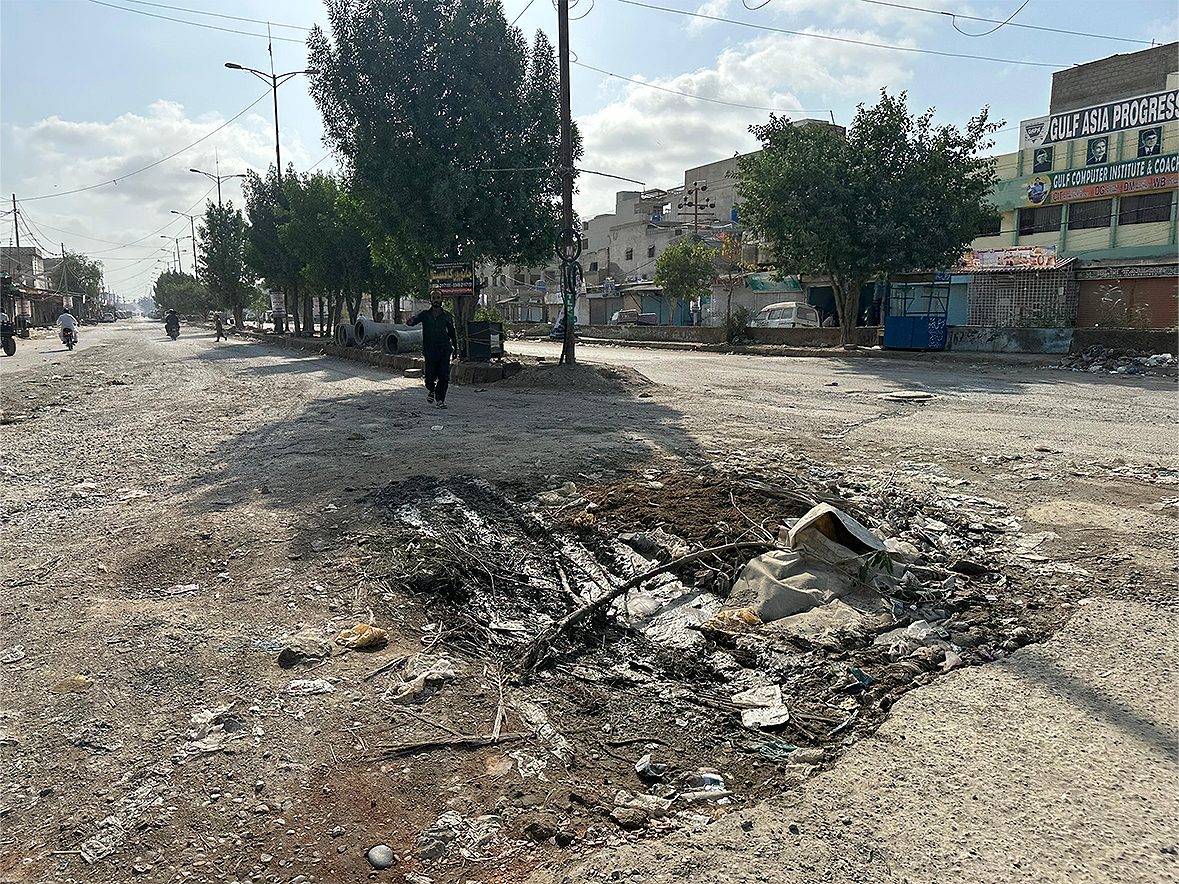KARACHI: For commuters in Karachi, a bustling port city and Pakistan’s economic powerhouse, daily travel has turned into a perilous journey as residents have to go through potholes, craters and uncovered manholes every few meters on thousands of major and minor roads across the city.
Years of neglect and a lack of ownership have left the city’s infrastructure in disrepair, a situation further exacerbated by the recent monsoon rains, which has made it difficult for the people to navigate the city sprawling over 3,780 square kilometers.
“The whole city looks like Mohenjo-daro,” said Shakeel Salat, a trader in downtown Saddar, referring to an archaeological site in the Sindh province that was built around 2500 BCE and was once the largest settlement of the ancient Indus Valley Civilization.

The picture shows Karachi Map. (Commissioner Karachi/website)
“Although this is Karachi, a city that generates revenue, but it is being overlooked.”
Arab News conducted a tour of hundreds of roads in all seven districts of Karachi and found that almost all of them were partially or fully damaged, except for Korangi Creek Road and Shahrah-e-Faisal. Even the busiest thoroughfares like the M.A. Jinnah Road and University Road were in dilapidated conditions.

The picture shared on September 23, 2024, shows commuters passing through the Liaquatabad flyover in Karachi, Pakistan. (AN photo)
In Orangi Town, Bakht Afsar Khan, an auto-rickshaw driver, told Arab News derelict roads had caused him to regularly repair his ride.
“The car’s axle breaks, the tire also gets punctured, and the entire vehicle’s material gets damaged,” he told Arab News, adding that he spent Rs10,000 ($36) on his rickshaw’s repairs this past week.

The picture shared on September 23, 2024, shows a pothole in the middle of Selani Road in Karachi, Pakistan. (AN photo)
Khan said driving his rickshaw on bumpy roads causes stomach aches and makes it difficult for him to drive for long. “We can’t drive [continuously] for an hour because of the potholes and the condition of the road,” he said.
Naghma Niazi, a public relations officer at a health facility, said traveling to M.A. Jinnah Road from her residence in North Nazimabad and coming back “tests her patience” daily.
“These broken roads are severely affecting traffic, wasting our time, and no one seems to care,” she said, adding that crumbling roads force vehicles to move slowly and in turn increase fuel consumption.
“Just imagine a person setting out in their vehicle only to encounter these dilapidated roads, while dealing with high fuel prices. What a frustrating situation it would be for them?”

The picture shared on September 23, 2024, shows a pothole in the middle of Muhammad Ali Jinnah Road in Karachi, Pakistan. (AN photo)
Of the thousands of roads in the city, a majority has no one responsible of repairs. The Karachi Metropolitan Corporation (KMC), which provides municipal services in most of Karachi’s areas, has a list of only 106 roads.
Muhammad Toheed, an urban planner, explained that a lack of data and the complex governance structure hindered civic accountability in the city of over 20 million.
“Karachi might be the only city where it takes days to understand the complexity of its urban governance,” he said, explaining that the city has 19 land-owning agencies.

The picture shared on September 23, 2024, shows commuters traveling on Maulana Yusuf Ludhianvi Shaheed Road in Karachi, Pakistan. (AN photo)
The KMC owns 106 roads, while 25 other towns and five cantonment boards have their own jurisdiction, according to Toheed.
“People look to the mayor, but the mayor is specifically responsible for only 106 roads,” he said.
Mayor Murtaza Wahab Siddiqui complained he had no jurisdiction over most of the city, but the anger was still directed at him.
“The buck falls on the mayor, the buck falls on the KMC, but when it comes to collecting resources, when it comes to collecting revenue by way of different taxes, there are many different entities that operate in the city,” he said, calling it “the real problem.”

The picture shared on September 23, 2024, shows commuters traveling on Sarwar Shaheeb Road in Karachi, Pakistan. (AN photo)
The solution to this issue lies in fixing responsibility and pinpointing which area belonged to which entity, according to the mayor.
“But unfortunately, that is not the case for the city of Karachi,” he said, sharing his plans to renovate the KMC-owned roads.
Siddiqui said the Sindh government had decided to contribute Rs1.5 billion, which, in addition to Rs600 million from the KMC’s account, would be spent on improving the condition of major arteries of the city.
But the mayor said he felt there should be an adequate allocation in the Public Sector Development Program (PSDP) of the federal government for Karachi’s infrastructure.
“All those taxes go to the federal government,” he said, reminding that the country’s two major ports, Karachi Port Trust and Port Qasim, existed in Karachi and the city contributed up to 65 percent to the overall revenue collection in the country.
“Their transport, their carriage goes through our streets, our arteries,” he said. “They use our infrastructure, but they don’t contribute to our local taxes.”
Siddiqui admitted that corruption by way of using low-quality material in the construction of roads was also part of the problem.
He said he took notice when nearly three dozen roads, which were renovated in 2022-2023 with an amount of roughly Rs7 billion, got damaged shortly afterwards.
“Those roads will be reconstructed without any additional funds being given by the government to the existing contractors,” the mayor said.
But the present condition of roads has already cost Usman Ghani, who works in a local factory, a lot for taking his car to work every day.
“No matter where you go in Karachi, the condition of the roads is extremely poor,” he said, as he drove over a bumpy, decrepit patch in the SITE industrial area.




















